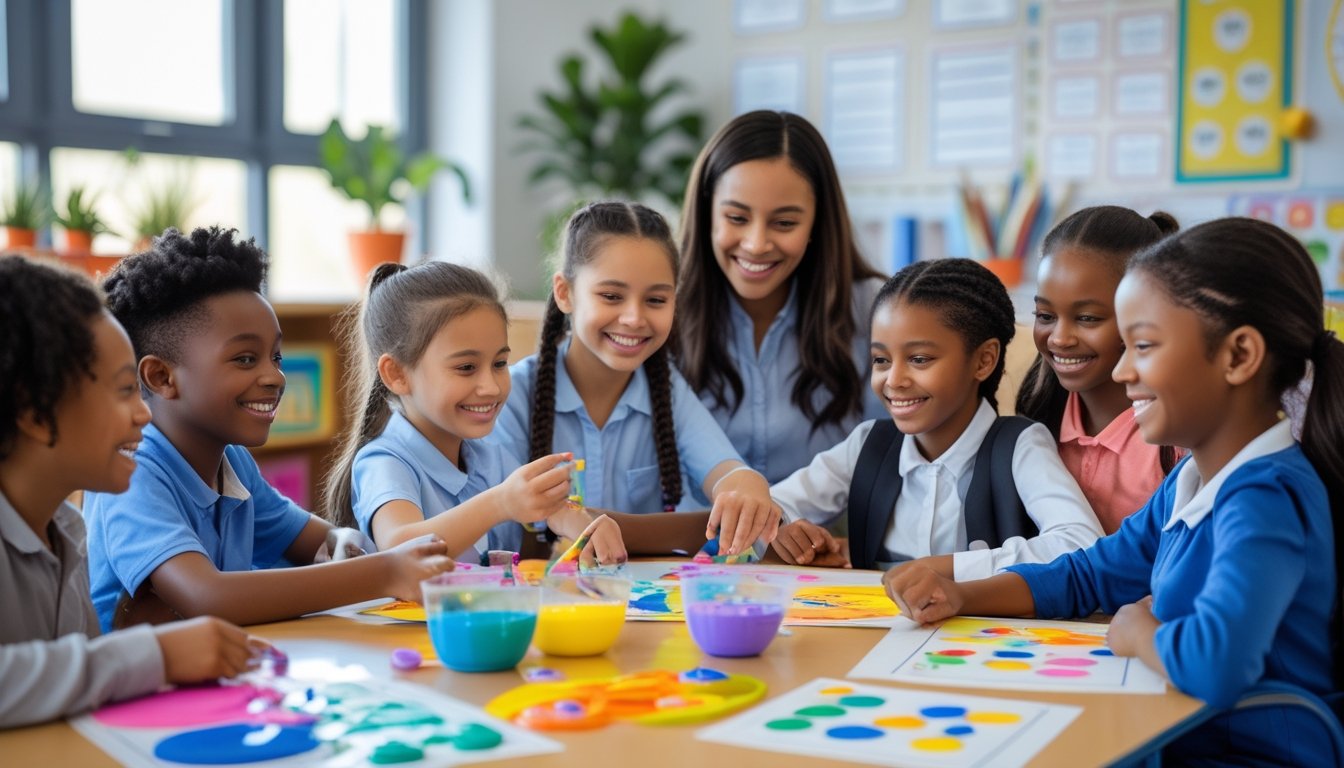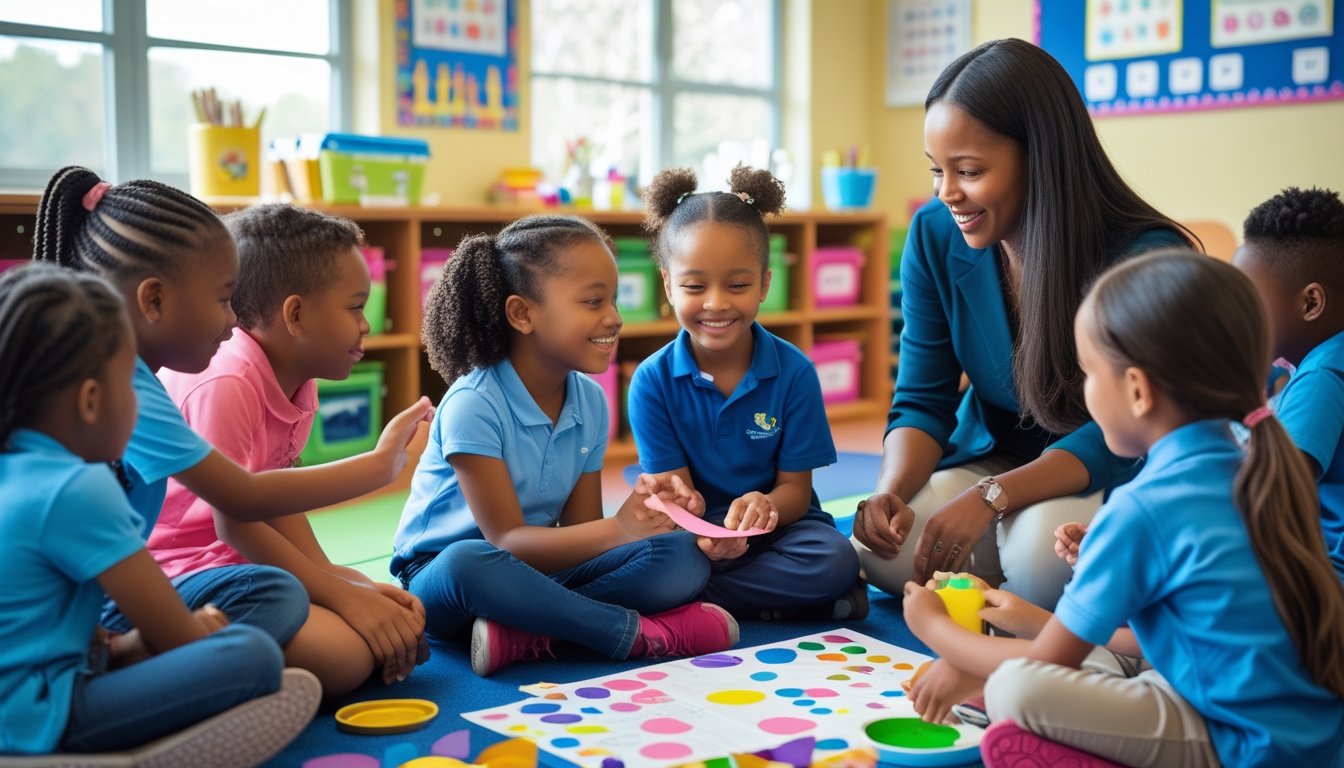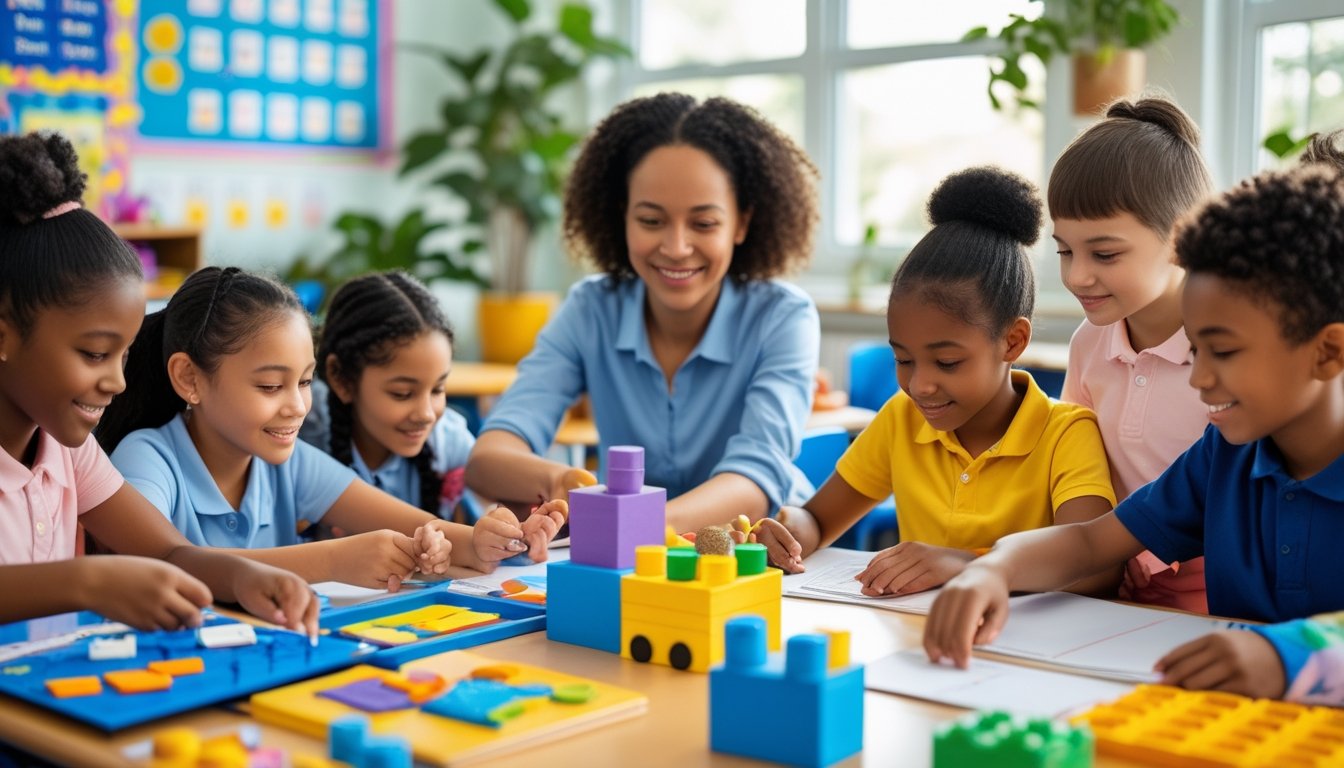Late updated: 02 Oct 2025 09:10
Written by:
Encouraging Emotional Growth Through School Activities: Promoting Wellbeing in Education
Encouraging emotional growth in students is crucial in today's education system. With various challenges that children face, schools can provide a supportive environment where they learn to manage emotions. By incorporating activities such as empathy workshops, storytelling circles, and mindfulness exercises, we can address emotional development directly.

Engaging students in activities that foster emotional growth not only aids in personal development but also enhances their academic success and social interactions. We want to inspire educators and parents alike to understand that these activities are not mere add-ons but integral to a student's overall ability to navigate life effectively.
Among the many options available, activities focusing on social-emotional learning (SEL) can greatly impact young minds. Through structured practices like self-regulation activities and feelings check-ins, students are equipped to face challenges with resilience. The tangible outcomes we observe underscore the importance of embedding such practices into daily routines.
Key Takeaways
- School activities can significantly enhance emotional growth.
- Emotional growth activities improve both personal and academic success.
- SEL practices are crucial for building resilience and self-regulation.
Foundations Of Emotional Growth Through School Activities

Emotional growth in schools is anchored on fostering social-emotional learning (SEL), which equips students with crucial skills. It is vital to create a classroom environment that actively supports this growth, focusing on self-awareness, empathy, and emotional regulation.
Core Principles Of Social-Emotional Learning (SEL)
Social-emotional learning hinges on five core competencies: self-awareness, self-management, social awareness, relationship skills, and responsible decision-making. We view these as the foundation upon which emotional growth is built. SEL encourages children to understand their emotions and develop empathy towards others, which is crucial for effective interactions. In school settings, SEL is often integrated into the curriculum through activities that promote collaboration and conflict resolution. By embedding SEL principles into daily school life, we nurture a supportive community that enhances both academic and personal success.
Key Emotional And Social Skills Developed In Schools
Schools play a significant role in developing important emotional and social skills in children. By participating in activities such as group projects, role-playing, and class discussions, students learn vital skills like empathy, teamwork, and communication. We recognise that these activities foster emotional intelligence by allowing students to practise managing their emotions and better understand those of others. Additionally, through structured SEL activities, children are exposed to diverse perspectives, further enriching their social awareness and strengthening their ability to adapt in various social contexts. This skill set is essential for preparing them to navigate complex social dynamics both within and outside school environments.
The Role Of The Classroom Environment In Emotional Development
The classroom environment is pivotal in nurturing emotional development. We understand that a positive and inclusive atmosphere encourages students to express themselves freely and engage fully. Classrooms designed to support emotional growth often include spaces for reflection, activities promoting mindfulness, and resources that teach coping strategies. Teachers play a crucial role in this environment by modelling positive interactions and addressing emotional challenges sensitively. By creating a supportive setting, we enable students to develop resilience, ultimately contributing to their overall well-being. Furthermore, fostering an environment where mistakes are seen as learning opportunities helps students build confidence and perseverance.
Effective Strategies And Activities For Fostering Emotional Growth
Encouraging emotional growth in schools involves strategies that promote collaboration, empathy, and positive communication. By implementing structured activities, students can develop essential social skills and experience a supportive environment.
Collaborative Exercises And Group Work
Group activities play a vital role in enhancing emotional growth among students. Team-building exercises provide opportunities to work on communication and cooperation. Classroom discussions and debates encourage students to express and respect different viewpoints. Through collaboration, students not only learn to compromise and resolve conflicts but also develop trust in their peers. This nurtures a classroom community where everyone feels valued and heard.
Projects that focus on shared goals encourage students to rely on each other. For instance, group art projects or science experiments can teach students how to navigate challenges together. Regular reflection sessions after these activities allow students to evaluate their experiences, fostering a deeper understanding of teamwork.
Building Empathy And Fairness Through Lessons
Integrating lessons that emphasise empathy helps students to understand and appreciate diverse perspectives. Role-playing activities are effective in teaching empathy by placing students in different scenarios where they must consider others' feelings and reactions. Classroom discussions around themes of fairness and justice enable students to engage with real-world issues.
By studying characters in literature or history lessons, students can explore complex emotions and build a sense of fairness and justice. Teachers can support this development by highlighting stories of diverse individuals and their experiences. Active listening exercises, where students must listen and respond thoughtfully, also strengthen empathy.
Promoting Positive Social Interactions And Communication
Developing strong social skills requires nurturing positive social interactions. Encouraging students to engage in active listening and respectful dialogue helps in understanding and respecting peers' perspectives. Classroom rules that promote kindness and inclusive communication lay the foundation for these interactions.
Regular group activities offer students the chance to practice these skills in a controlled environment. By modelling positive interactions and providing prompts, teachers can guide students towards improved communication. Opportunities for students to lead discussions or presentations allow them to hone their speaking and listening abilities, building confidence in social settings.
Supporting Emotional Well-Being With Positive Feedback
Feedback is essential in promoting emotional well-being. By providing specific and positive feedback, teachers can reinforce desired behaviours and support emotional development. Recognising students' efforts fosters a sense of achievement and motivation. Simple gestures, like acknowledging a student's progress or praising their contribution to group work, can have a significant impact.
Creating a classroom environment where positive feedback is a central component encourages students to try new things and take risks. Establishing regular feedback sessions, where both peer and teacher feedback are shared, helps students understand their strengths and areas for improvement. This affirmation builds confidence and encourages continued personal and academic growth.
Frequently Asked Questions

In our exploration of strategies to encourage emotional growth through school activities, we'll address key aspects such as implementing effective programmes, fostering inclusivity, and understanding the role of peer interactions.
What strategies can schools implement to support students' emotional development?
Schools can implement a variety of strategies to support emotional development. Incorporating social-emotional learning (SEL) into the curriculum is essential. By using activities like mindfulness exercises, students learn to manage emotions effectively. Encouraging an open dialogue about feelings and providing a safe space for expression are also key strategies.
How can extracurricular activities contribute to a child's emotional intelligence?
Extracurricular activities such as drama, music, and sports play significant roles in developing a child's emotional intelligence. These activities offer opportunities for teamwork, leadership, and empathy. By experiencing different roles and perspectives, children enhance their ability to understand and manage emotions in diverse situations.
What role do educators play in fostering a supportive environment for emotional growth?
Educators are crucial in creating a supportive environment for emotional growth. They model healthy emotional expressions and nurture open communication. By integrating emotional development into daily interactions, teachers help students build resilience and emotional awareness, providing the guidance needed to navigate complex social interactions.
Which school-based programmes have proven effective in enhancing emotional resilience in children?
Programmes such as mindfulness training, peer mentoring, and conflict resolution workshops have shown effectiveness in enhancing emotional resilience. These initiatives, alongside structured SEL curricula, equip children with skills necessary to handle adversity, reduce stress, and build stronger peer relationships.
How can peer interactions within school settings influence emotional development?
Peer interactions are central to a child's emotional development. They offer real-world contexts for practising empathy, conflict resolution, and cooperative problem-solving. Through group work and social activities, students learn to recognise and appreciate diverse perspectives, which bolsters emotional intelligence.
What measures can schools take to ensure inclusivity in activities that promote emotional well-being?
To ensure inclusivity, schools should provide diverse activities that cater to varying interests and abilities. It's important to foster an environment where every child feels valued and supported. Tailoring activities to ensure accessibility can help in reaching students with different emotional and social needs, creating a more inclusive setting.
